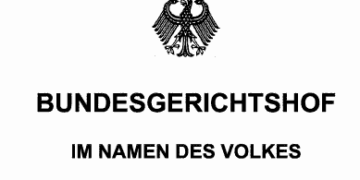The Cologne Higher Regional Court (OLG) prohibited the use of the domain www.wir-sind-afd.de, rejecting an appeal against the identical judgment of the Cologne Regional Court.
Contrary to the view of the defendant, the abbreviated designation “B-Party” is protected as a name under Section 12 of the German Civil Code. This is not contradicted by the fact that the plaintiff uses the name “B.” in accordance with § 1 sentence 1 of its articles of association and that the name “B-Partei” in accordance with § 1 sentence 2 of its articles of association is merely the abbreviated name of the party.
The protection of the right to a name pursuant to Section 12 BGB requires that the name is inherently distinctive (original distinctiveness) or has a reputation in the trade and may, under these conditions, also extend to the abbreviations derived from the name (see BGH, judgment of December 16, 2004 – I ZR 69/02 – para. 20 et seq., juris – Literaturhaus; BGH, judgment of November 6, 2013 – I ZR 153/12 – para. 10, juris – sr.de).
Contrary to the earlier opinion of the Federal Court of Justice (BGH, judgment of February 24, 1965 – IV ZR 81/64 – para. 26, juris = BGHZ 43, 245 et seqq. – GDP), sequences of letters, even if they are not pronounceable as a word, can have original distinctiveness (cf. BGH, judgment of 05.10.2000 – I ZR 166/98 – para.17, juris – DB Immobilienfonds; BGH, judgment of 06.11.2013 – I ZR 153/12 – para. 11, juris – sr.de; on company law, BGH, judgment of December 8, 2008 – II ZB 46/07 – marginal no. 12 ff., juris – HM & A). This is the case if the designation used has an individualizing character, i.e. if it has a distinctive character as a name and is thus inherently suitable for exercising a name function (BGH, judgment of February 24, 1965 – IV ZR 81/64 – Rz. 26, juris = BGHZ 43, 245 ff. – GDP). The abbreviation “B-Partei”, which does not have a merely descriptive character, serves to individualize the plaintiff and thus inherently has original distinctiveness, with the consequence that the protection of this designation under name law for the plaintiff already began with the commencement of its use in commerce (cf. BGH, judgment of 06.11.2013 – I ZR 153/12 – para. 10, juris – sr.de). Against this background, whether other institutions also use the designation is irrelevant in the relationship between the plaintiff and the defendant, who is not itself the bearer of the name.
In addition, the abbreviation in the present case is protected under Section 12 of the German Civil Code even if it is not inherently distinctive, because it has a reputation. A name acquires a reputation if a not inconsiderable part of the public regards it as an indication of a certain name bearer (cf. BGH, judgment of February 24, 1965 – IV ZR 81/64 – Rz. 28, juris = BGHZ 43, 245 et seq. – GDP; Palandt/Ellenberger, loc. cit., Section 12 BGB para. 11 et seq.). The abbreviation “B-Partei” had already established itself as a designation for the plaintiff within the relevant public at the relevant time of registration of the domain in November 2015 (see BGH, judgment of February 24, 1965 – IV ZR 81/64 – para. 28, juris = BGHZ 43, 245 et seq. – GDP) and had also established itself in the public domain in accordance with the earlier case law of the BGH. The relevant public, which in the present case includes the politically interested sections of the population as well as the politically active institutions, associate and associated the applicant with the abbreviation “B-Partei” at the relevant time, November 2015. This is not contradicted by the fact that there were and are other users of the abbreviation, as shown by the defendant’s Exhibits B 7 (sheet 144 GA) and B 8 (sheet 291 GA). Of the institutions listed in the annexes, only two others – apart from the applicant – relate to the relevant public in the present case (B2, an electoral alliance founded in the GDR in 1990, and B3, an Ethiopian party alliance). Both are known in the relevant circles under the abbreviation “B party” at best to individual experts, especially since they have a different temporal (1990, GDR) and spatial (Ethiopia) relevance. In contrast, the plaintiff has also achieved a high degree of recognition in view of considerable media presence, whereby the abbreviation is just as distinctive for the plaintiff as its full name, as it is for other parties (see also OLG Karlsruhe, judgment of 01.09.1972 – 10 U 137/72 – para. 25, juris). The defendant himself also assumes this. He uses the abbreviation precisely to exploit the high profile of the plaintiff under this signum for his purposes of criticizing the plaintiff.”











































